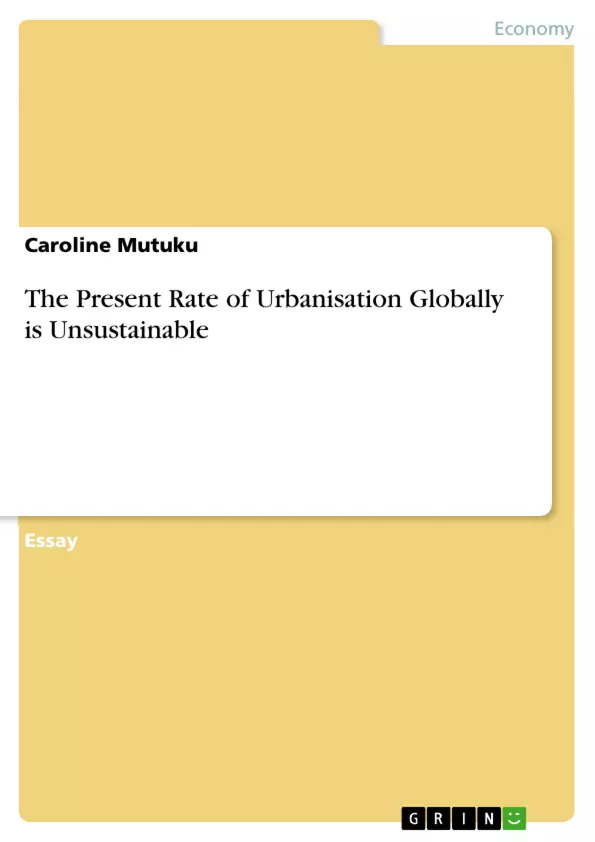Urbanisation is generally defined as the influx and increase of the number of people who live in the cities and major towns in a country (Pomeroy, 2007). It is caused by movement of people from rural areas to urban areas. The movement of people from rural to urban centres occur mainly due to increased population pressure and limited resources available for the large population in the rural areas. Global change can be mostly associated to urban drift and it contributes mostly to the people moving to the cities and towns. Most people move to urban centres in search of jobs and better living standards which are associated with urban areas (Clark, 2003). Various arguments have been advanced by scholars on whether urbanisation is sustainable or unsustainable. In order to understand the sustainability of urbanisation it is good to consider economic, social, political, cultural and environmental effects of urbanisation. Urbanisation presents both positive and negative effects and thus studying its effects is important to understand whether it is sustainable or unsustainable. The increase in urbanisation occurred during the industrialization period which took place in Europe in the late nineteenth and early twentieth centuries. During this period, large masses of people moved from rural areas to urban areas in search of employment in the industries (Pomeroy, 2007). As a general statement, the effects of urbanisation are diverse. Therefore, sustainability of urbanisation can be established through a comprehensive of the main effects. This paper will discuss the social, economic and political impacts of urbanisation and from the impacts conclude whether urbanisation is sustainable or unsustainable.
Table of Contents
- Introduction
- Social Effects of Urbanisation
- Increase in Crime Rate
- Increased Unemployment
- Emergence of Slums
- Poor Housing
- Limited Access to Basic Needs
- Inadequate Education and Healthcare Systems
- Economic Effects of Urbanisation
- Increased Poverty
- Increased Cost of Living
- Impact on Economic Growth
- Government Expenditure
- Political Effects of Urbanisation
- Political Violence
- Cultural and Political Diversity
- Environmental Effects of Urbanisation
- Pollution of Land, Water, and Air
- Loss of Wildlife, Forests, and Agricultural Land
- Urban Sprawl
- Positive Impacts of Urbanisation
- Provision of Labour
- Social and Cultural Integration
- Economic Growth
- Commercial Activities
- Conclusion
Objectives and Key Themes
This paper critically analyzes the sustainability of urbanisation, examining its social, economic, and political impacts. The objective is to determine whether the current rate of urbanisation is sustainable and to identify its major challenges. The paper highlights the significant negative impacts of urbanisation on various aspects of society, including social well-being, economic development, and political stability.- The unsustainable impacts of rapid urbanisation
- Social consequences of urbanisation, such as increased poverty, crime, and slums
- Economic implications of urbanisation, including increased government expenditure and limited job opportunities
- The role of urbanisation in political instability and violence
- The environmental effects of urbanisation, such as pollution and urban sprawl
Chapter Summaries
The paper argues that the present rate of urbanisation is unsustainable, citing numerous negative effects on society. It focuses on the consequences for social well-being, including the rise of slums, increased crime, and inadequate access to basic needs. The paper also explores the economic impacts of urbanisation, highlighting the strain on government resources and the challenges of unemployment. The paper further examines the potential for political instability stemming from urbanisation. Finally, it addresses the environmental consequences, including pollution and urban sprawl. While acknowledging some positive effects of urbanisation, the paper emphasizes that the negative impacts outweigh the benefits.Keywords
The main keywords and focus topics of this text include urbanisation, sustainability, social impact, economic impact, political impact, environmental impact, slums, crime, unemployment, pollution, urban sprawl, and resource scarcity. The paper examines the intricate relationship between urbanisation and its implications for various aspects of society and the environment. It delves into the challenges posed by rapid urbanisation and explores potential solutions to mitigate its negative effects.- Quote paper
- Caroline Mutuku (Author), 2018, The Present Rate of Urbanisation Globally is Unsustainable, Munich, GRIN Verlag, https://www.grin.com/document/429721




